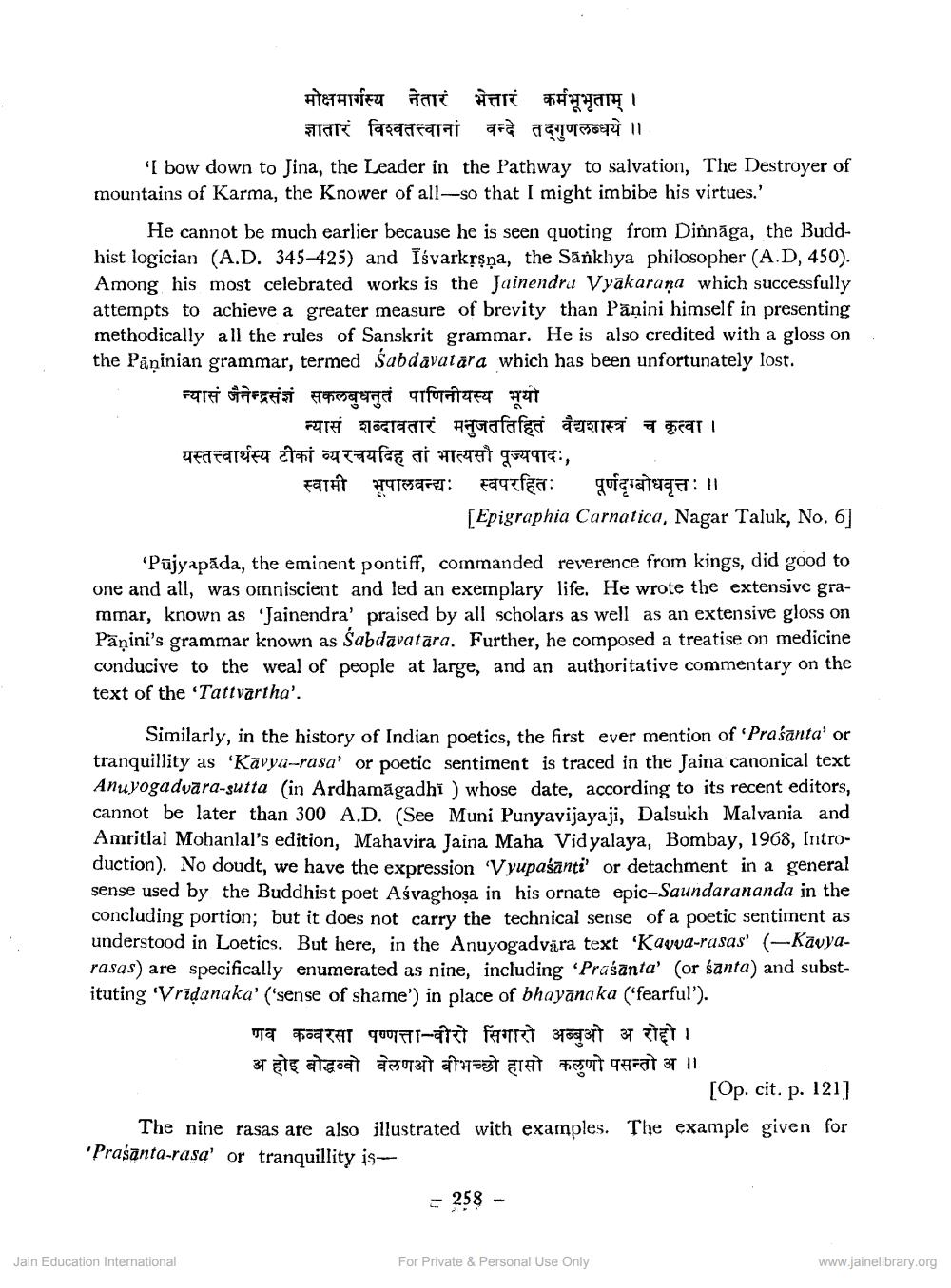Book Title: Contribution of Karnataka to Jain Literature and Culture Author(s): K Krishnamoorthy Publisher: Z_Kailashchandra_Shastri_Abhinandan_Granth_012048.pdf View full book textPage 2
________________ मोक्षमार्गस्य नेतारं भेत्तारं कर्मभूभृताम् । ज्ञातारं विश्वतत्त्वानां वन्दे तद्गुणलब्धये ॥ 'I bow down to Jina, the Leader in the Pathway to salvation, The Destroyer of mountains of Karma, the Knower of all so that I might imbibe his virtues.' He cannot be much earlier because he is seen quoting from Dinnāga, the Buddhist logician (A.D. 345-425) and Iśvarkrşna, the Sankhya philosopher (A.D, 450). Among his most celebrated works is the Jainendra Vyakarana which successfully attempts to achieve a greater measure of brevity than Pāṇini himself in presenting methodically all the rules of Sanskrit grammar. He is also credited with a gloss on the Paninian grammar, termed Sabdavatara which has been unfortunately lost. न्यासं जैनेन्द्रसंज्ञं सकलबुधनुतं पाणिनीयस्य भूयो न्यासं शब्दावतारं मनुजततिहितं वैद्यशास्त्रं च कृत्वा । यस्तत्त्वार्थस्य टीकां व्यरचयदिह तां भात्यसौ पूज्यपादः, स्वामी भूपालवन्द्यः स्वपरहितः पूर्णदृम्बोधवृत्तः ।। [Epigraphia Carnatica, Nagar Taluk, No. 6] 'Pujyapada, the eminent pontiff, commanded reverence from kings, did good to one and all, was omniscient and led an exemplary life. He wrote the extensive grammar, known as Jainendra' praised by all scholars as well as an extensive gloss on Paņini's grammar known as Sabdavatara. Further, he composed a treatise on medicine conducive to the weal of people at large, and an authoritative commentary on the text of the 'Tattvartha'. Similarly, in the history of Indian poetics, the first ever mention of 'Prasanta' or tranquillity as 'Kavya-rasa' or poetic sentiment is traced in the Jaina canonical text Anuyogadvara-sutta (in Ardhamāgadhi ) whose date, according to its recent editors, cannot be later than 300 A.D. (See Muni Punyavijayaji, Dalsukh Malvania and Amritlal Mohanlal's edition, Mahavira Jaina Maha Vidyalaya, Bombay, 1968, Introduction). No doudt, we have the expression "Vyupasanti' or detachment in a general sense used by the Buddhist poet Asvaghosa in his ornate epic-Saundarananda in the concluding portion; but it does not carry the technical sense of a poetic sentiment as understood in Loetics. But here, in the Anuyogadvära text 'Kavva-rasas' (Kavyarasas) are specifically enumerated as nine, including "Prasanta' (or santa) and substituting 'Vrīdanaka' ('sense of shame') in place of bhayanaka ('fearful'). णव कन्वरसा पण्णत्ता-वीरो सिंगारो अब्बुओ अ रोहो । अहोइ बोद्धब्बो वेलणओ बीभच्छो हासो कलुणो पसन्तो अ॥ [Op. cit. p. 121] The nine rasas are also illustrated with examples. The example given for 'Prasanta-rasa' or tranquillity is - 258 - Jain Education International For Private & Personal Use Only www.jainelibrary.orgPage Navigation
1 2 3 4 5 6 7 8 9 10 11
